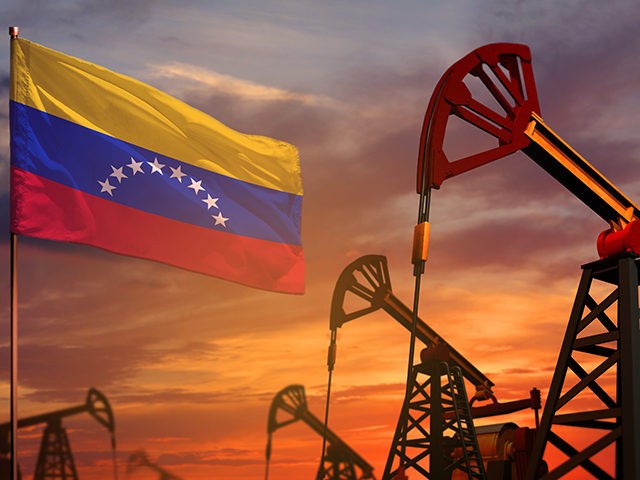José Guerra, a member of Venezuela’s National Assembly, lamented in an interview highlighted by Venezuelan outlet Dólar Today on Tuesday that “no solution” exists to Venezuela’s chronic gasoline shortages because socialist mismanagement has destroyed the nation’s refineries.
Venezuela has experienced chronic gasoline shortages for months, resulting in large crowds gathering to fight over the little fuel available in major cities despite strict Chinese coronavirus lockdowns. Violence in the crowds is not uncommon, on some occasions leading to killings.
The shortages — adding to Venezuelans failing to receive adequate access to water, electricity, food, health care, and other basic needs — are particularly striking given that Venezuela was home to the world’s largest known oil reserves until a 2018 oil discovery in Texas. Venezuela is a member nation of the Organization of the Petroleum-Exporting Countries (OPEC).
Venezuela’s crude oil is of a notoriously heavy quality, however, needing significant refining, and cannot supply the gasoline market without being thoroughly processed.
The regime of socialist dictator Nicolás Maduro has repeatedly blamed President Donald Trump for the nation’s gasoline shortages, claiming that sanctions on Petróleos de Venezuela (PDVSA), the nation’s state-run oil company, are what prevent his regime from adequately refining the oil. In an interview with the outlet Vivo Play on Monday, Guerra, an economist by trade, refuted the idea that sanctions are playing any significant role in gasoline shortages, blaming Maduro’s failure to properly manage PDVSA instead.
.@JoseAGuerra, diputado a la AN, analiza las medidas que toma el régimen de Maduro para solucionar la escasez de gasolina y recalcó que “la causa de la carencia no es el bloqueo ni las sanciones, es la destrucción del sistema de refinación”. #VIVOplay por: https://t.co/AyzOvt2CQ3 pic.twitter.com/8Cx7sxeJLK
— VIVOplay (@vivoplaynet) September 14, 2020
“There is no solution at the moment to this problem of the shortages, and there’s no solution because the problem is that Venezuelan refineries were destroyed,” Guerra asserted.
Guerra blamed Maduro and his predecessor, Hugo Chávez, for gutting the core staff at PDVSA and replacing most with socialist cronies in the past 20 years, leaving highly sophisticated refining equipment in the hands of people who had no experience using it. The result, he contended, has been a total lack of maintenance of the equipment and, in some cases, active destruction of it, to the point where Venezuela has no significant ability to refine any oil.
The top four oil refineries in the country “literally do not exist,” Guerra asserted.
“Lack of maintenance, lack of investment … Those refineries were capable of producing daily about 1.3 million barrels of oil, 4 million liters, more than enough to satisfy the internal demand and export the surplus,” Guerra explained. “[The refineries were] destroyed under Hugo Chávez and, now, under Maduro, and the result has been that Venezuela has to import gasoline from various countries — Italy, Spain, and now Iran.”
Iran — itself struggling to sell its oil under onerous American sanctions, triggered by Tehran’s investment in terrorist activities throughout the Middle East and Latin America — has taken on Venezuela as a customer in recent months, resulting in much fanfare in Venezuelan state media. The sales violate sanctions and American forces have intercepted several fuel shipments from Tehran to Caracas. Maduro has greeted the few tankers that have made it to Venezuela as the solution to gasoline supply issues and proof that socialism can survive what he has repeatedly called an “economic war” waged by Washington.
Guerra noted that the sheer inconvenience of the trip from Tehran to Caracas makes Iranian oil a poor long-term solution for the Venezuelan gasoline shortage issue.
“To give you an idea, a ship that leaves the Persian Gulf … navigates 130,000 kilometers [80,700 miles] to get to Venezuela,” Guerra noted. “That is not the solution to the problem of gasoline shortages.”
“The cause of the shortages is not the blockade, it’s not the shortages — it’s the destruction of the refinery systems,” Guerra concluded.
As of July, Venezuela was refining about 422,400 barrels of crude oil per day, according to Bloomberg News, a 32-percent drop from May — the least productive numbers since the 1940s. While refineries fail to produce enough refined oil, Venezuelans are also contending with overt signs of government incompetence regarding the handling of crude oil. One of the most dramatic examples of this occurred in the town of Cabimas this month, where residents filmed their streets flooded with toxic crude oil after only hours of rain appeared to burst an oil pipe. International observers have also noted that Venezuela’s Caribbean beaches are dealing with an increasingly dangerous oil spill, the origin of which remains a mystery.
In the past, Guerra has noted that incompetence at the technical level at PDVSA was part of the problem, but corrupt officials siphoning profits out of the state-run company also fed into it. Venezuelans have enjoyed government-subsidized oil prices for decades that have made gasoline nearly free. Maduro changed the system in response to shortages this year, increasing the price from about 100 bolívars a tank ($0.0005) to 5,000 bolívars a liter ($0.01). Assuming 40 liters is about a full tank of gasoline, a person making 800,000 bolívars ($2.11) a month on minimum wage can expect to pay 200,000 bolívars to fill their tanks – or a fourth of their monthly salary.
The increase in pricing, Guerra argued in May, would result in kickbacks to public officials. “The system is made for corruption,” he asserted.

COMMENTS
Please let us know if you're having issues with commenting.